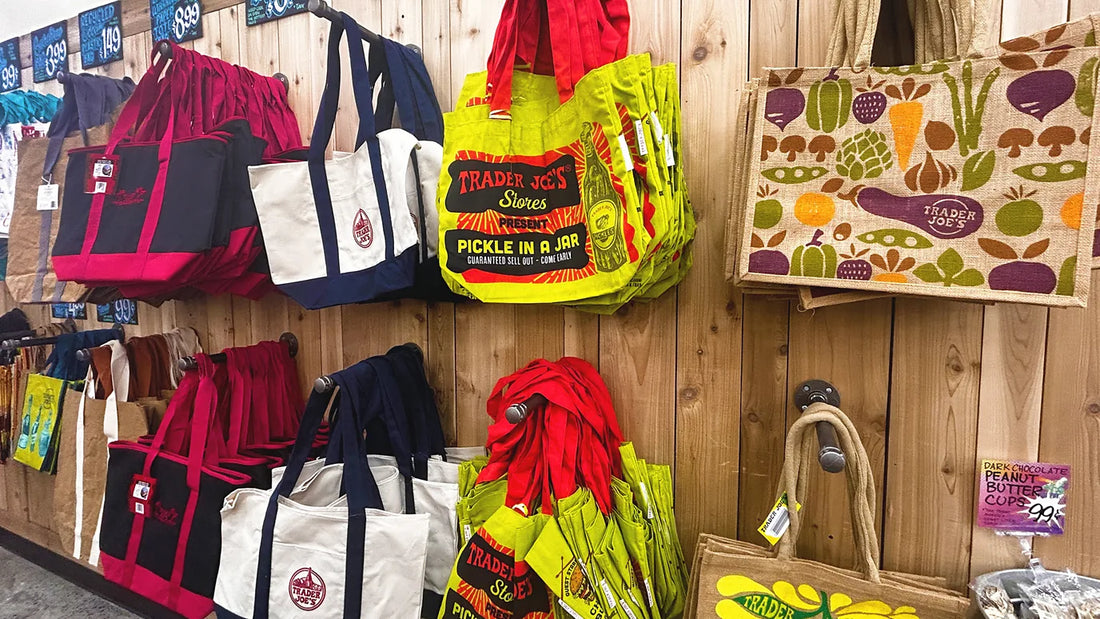
Boost Your Brand's BTL Presence With Brand-Customized Reusable and Eco-Friendly Bags
Share
Consumers are becoming more eco-conscious, and brand-customized reusable and eco-friendly bags make excellent marketing sense. These bags—whether made from jute, canvas, or any other renewable fiber—align perfectly with the sustainability commitments of organizations and offer multiple benefits that outweigh their initial costs.
These bags signal the company's dedication to promoting green habits and responsible practices. By choosing these bags over plastic ones, businesses demonstrate their responsibility towards the environment. This commitment resonates with educated, upwardly mobile, and environmentally aware consumers, enhancing brand reputation and fostering loyalty.
Below are initiatives by some brands across the world and India that showcase the benefits of such strategies. We hope this article reaches brand custodians and convinces them to explore this avenue for gaining brand love.
Patagonia's Eco-Friendly Approach
Patagonia, a company renowned for its environmental stewardship, offered reusable shopping bags made from recycled materials. This move not only reduced plastic waste but also reinforced Patagonia’s image as a leader in sustainability. The initiative garnered positive media attention and customer praise, proving that eco-friendly efforts can significantly boost a brand's visibility and reputation. This led to clear advantages:
Increased Brand Visibility: The brand's visibility increased significantly as these sturdy and stylish bags were used repeatedly by consumers over their lifespan. Unlike single-use plastic bags, which are discarded after one use, reusable shopping bags act as mobile advertisements, seen by a broader audience multiple times.
Customer Usability and Satisfaction: From a consumer perspective, these bags offer high usability. They are sturdy, durable, and cost-efficient in the long run. A well-made jute or canvas bag can replace hundreds of plastic bags, reducing the carbon footprint and encouraging sustainable habits. Customers appreciate products that are both functional and environmentally friendly, leading to increased satisfaction and brand loyalty.
Trader Joe's Reusable Bags
Trader Joe's, a popular grocery chain, has successfully incorporated reusable bags into their customer experience. Their iconic shopping bags, made from recycled materials, are practical and stylish, featuring unique designs that change periodically. This strategy keeps customers excited about collecting new designs, promoting repeat purchases and frequent use, thereby increasing brand visibility.
Economic and Environmental Benefits: While the initial investment in eco-friendly bags might seem higher, the long-term economic and environmental benefits are substantial. Businesses can reduce costs associated with single-use plastic bags, which are often subject to environmental taxes and disposal fees. Additionally, promoting reusable bags helps reduce plastic waste and its harmful effects on the environment.
Supporting the Local Economy: Eco-friendly bags can generate local employment. Most of these bags are produced in factories with a low carbon footprint, employing local artisans and workers. This supports the local economy and reflects the company’s commitment to social responsibility. By sourcing materials and manufacturing locally, companies can ensure quality and reduce transportation emissions, further lowering their carbon footprint.
Dabur
Dabur, a leading FMCG company in India, has taken steps to reduce plastic use across its product packaging and is moving towards sustainable packaging by introducing reusable jute bags for their customers. By distributing eco-friendly jute bags during promotional events and campaigns, Dabur highlights its dedication to environmental conservation. This initiative also supports local artisans who produce these bags, boosting the local economy and creating community impact.
Reliance Fresh
Corporate Social Responsibility: Reliance Fresh, part of Reliance Retail, has incorporated reusable bags into their operations. They promote the use of cloth bags and often sell them at their stores to encourage customers to switch from plastic.
Visibility and Branding: These cloth bags, often branded with the Reliance Fresh logo, serve as a constant reminder of the brand’s commitment to reducing plastic pollution. This continuous visibility helps reinforce the brand’s eco-friendly image.
Tata Starbucks
Green Initiatives: Tata Starbucks has implemented several green initiatives, including offering reusable canvas and jute bags to their customers. They encourage customers to bring their own bags and cups, rewarding them with discounts.
Brand Loyalty: This initiative reduces waste and builds a strong connection with environmentally conscious consumers. The eco-friendly bags, branded with the Starbucks logo, are frequently used by customers and posted on social media, enhancing the brand’s visibility and commitment to sustainability.
Marketing Strategy and ROI
Marketers should view the investment in eco-friendly bags as a strategic corporate or marketing expense. Despite seeming costly upfront, the long-term benefits in terms of brand visibility, positive customer reviews, and alignment with corporate responsibility goals make it a worthwhile investment. Embracing this green initiative not only helps the planet but also builds a stronger, more respected brand with a loyal customer base.
